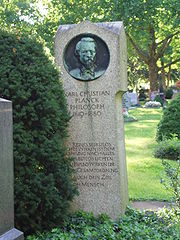
Karl Christian Planck
Encyclopedia

Germany
Germany , officially the Federal Republic of Germany , is a federal parliamentary republic in Europe. The country consists of 16 states while the capital and largest city is Berlin. Germany covers an area of 357,021 km2 and has a largely temperate seasonal climate...
philosopher.
Planck was born in Stuttgart
Stuttgart
Stuttgart is the capital of the state of Baden-Württemberg in southern Germany. The sixth-largest city in Germany, Stuttgart has a population of 600,038 while the metropolitan area has a population of 5.3 million ....
. He studied at Tübingen
Tübingen
Tübingen is a traditional university town in central Baden-Württemberg, Germany. It is situated south of the state capital, Stuttgart, on a ridge between the Neckar and Ammer rivers.-Geography:...
, where he became doctor of philosophy
Philosophy
Philosophy is the study of general and fundamental problems, such as those connected with existence, knowledge, values, reason, mind, and language. Philosophy is distinguished from other ways of addressing such problems by its critical, generally systematic approach and its reliance on rational...
in 1840 and Privatdozent
Privatdozent
Privatdozent or Private lecturer is a title conferred in some European university systems, especially in German-speaking countries, for someone who pursues an academic career and holds all formal qualifications to become a tenured university professor...
in 1848. During this period the influence of Reiff
Reiff
Reiff is a municipality in the district of Bitburg-Prüm, in Rhineland-Palatinate, western Germany....
led him to oppose the dominant Hegelianism of the time.
In 1850-1851 he published his great book, Die Weltalter, in which he developed a complete original system of philosophy, based on the realistic view that thought should proceed from nature to the highest forms of existence in the spiritual life. Not only did Planck oppose the idealism of his confreres; his views were, in another aspect, directly antagonistic to the Darwinian theory of descent, which he specifically attacked in Wahrheit und Flachheit des Darwinismus (Nördlingen
Nördlingen
Nördlingen is a town in the Donau-Ries district, in Bavaria, Germany, with a population of 20,000. It is located in the middle of a complex meteorite crater, called the Nördlinger Ries. The town was also the place of two battles during the Thirty Years' War...
, 1872).
The natural consequence of this individuality of opinion was that his books were practically disregarded, and Planck was deeply incensed. The ill success of Die Weltalter nerved him to new efforts, and he repeated his views in Katechismus des Rechts (1852), Grundlinien einer Wissenschaft der Natur (1864), Seele und Geist (1871), and numerous other books, which, however, met with no better fate. In the meantime he left Tübingen for Ulm
Ulm
Ulm is a city in the federal German state of Baden-Württemberg, situated on the River Danube. The city, whose population is estimated at 120,000 , forms an urban district of its own and is the administrative seat of the Alb-Donau district. Ulm, founded around 850, is rich in history and...
, whence he came finally to the seminary
Seminary
A seminary, theological college, or divinity school is an institution of secondary or post-secondary education for educating students in theology, generally to prepare them for ordination as clergy or for other ministry...
of Maulbronn
Maulbronn
Maulbronn is a city in the district of Enz in Baden-Württemberg in southern Germany.-History:Founded in 1838, it emerged from a settlement, built around a monastery, which belonged to the Neckar Community in the Kingdom of Württemberg. In 1886, Maulbronn officially became a German town and was an...
. He died in 1880 in an asylum after a short period of nervous prostration.
After his death a summary of his work came into the hands of K. Köstlin (author of Aesthetics, 1869), who published it in 1881 under the title Testament eines Deutschen, Philosophie der Natur und der Menschheit. Planck's views were elaborately developed, but his method of exposition told heavily against their acceptance. He regarded himself as the Messiah of the German people.
Beside the works above quoted, he wrote System des reinen Idealismus (1851); Anthropologie und Psychologie auf naturwissenschaftlicher Grundlage (1874); a political treatise, Bismarck : Süddeutschland und der deutsche Nationalstaat (1872); and Logisches Causalgesetz und natürliche Zweckmäßigkeit (1874).
See Umfrid, Karl Planck, dessen Werke und Wirken (Tübingen, 1881); and Schmidt, Das Lebensideal Karl Christian Plancks, in the Vortrage der philosophischen Gesellschaft (Berlin
Berlin
Berlin is the capital city of Germany and is one of the 16 states of Germany. With a population of 3.45 million people, Berlin is Germany's largest city. It is the second most populous city proper and the seventh most populous urban area in the European Union...
, 1896).

